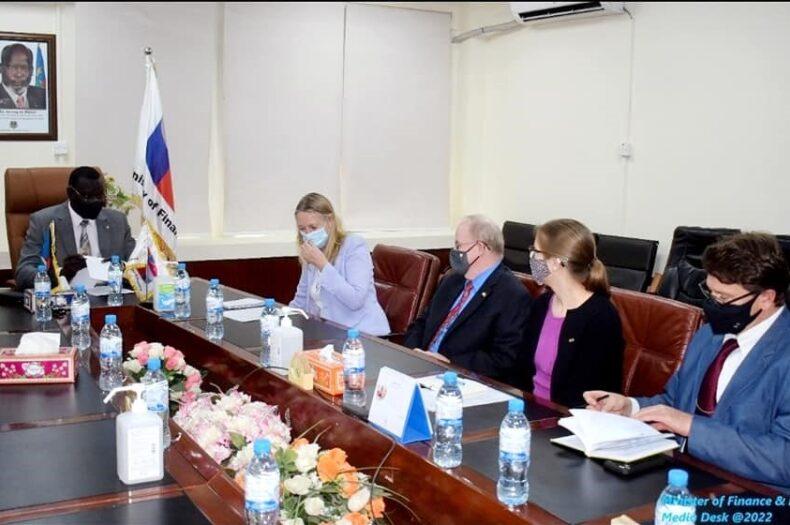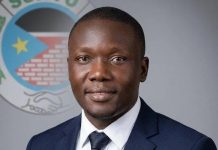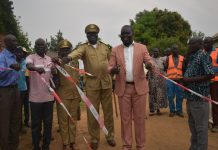Africa-Press – South-Sudan. The Minister for Finance and Planning, Agak Achuil, has pledged to sustain the economy through Public Financial Management Reforms. This came after his meeting with the Troika ambassadors on Tuesday, who discussed with him the Public Financial Management Reform agenda, enhancement of macroeconomic stability, sustainable financial resource mobilisation, effective planning and budgeting, prudent resource allocation and government spending, organisational capacity strengthening, and overall inter-governmental fiscal discipline.“I reassured the ambassadors of the commitment of President Salva Kiir Mayardit and his government to continue with the reform process,” said Agak on his Facebook post.
“We also touched on the issuance of sovereign guarantees, of which I informed the ambassadors of the leadership’s commitment to not backtrack on proper debt sustainability frameworks as well as the avoidance of non-concessionary oil.”
Agak reiterated the appointment of the Governor of the Bank of South Sudan (BSS) and the first undersecretary as efforts to enhance the economic reforms.
“On the appointment of the new Bank of South Sudan Governor and 1st Undersecretary: I reiterated that these new appointments shall not in any way affect the functioning of the Oversight Committee or PFMRS. If anything, their appointments will greatly enhance the ongoing reforms because these are officials who have been an integral part of the financial reform process since inception,” he added.
Calls for support
He called for support from development partners so that they could help in alleviating the effects of natural disasters like floods and the COVID-19 pandemic through humanitarian assistance.
“South Sudan is experiencing unprecedented challenges in the New Year, worsened by flooding that has destroyed sources of livelihoods across the country. Food insecurity and humanitarian situation are likely to worsen,” Agak noted.
“The leadership has taken note of these and is trying to put mechanisms in place to mitigate the impacts, but we call for a close collaboration with our development partners to consolidate and coordinate our efforts in providing assistance to those in need.”
Paradigm shift
In December, Moris Madut, the head of the department of economics at the University of Juba, advised the country to focus on non-oil revenue and shun borrowing. He warned that the country might be affected by food insecurity as a result of floods that caused utter destruction of crops in 2021.
“We expect that despite the challenges that we are still experiencing, with COVID-19 being one of them and flooding being another, we expect that, at least according to the focus by the IMF, the real GDP growth for the financial year 2021/2022 is projected to be at least 1 per cent, and this will be boosted by a little higher oil prices, so there is a significant increase in oil prices globally,” he said.
Moris said the Public Financial Management reforms were doing well, especially in maintaining the currency exchange rate. Thus, he advised that a transparent publication of the budget should be devised, arguing that the commodity prices might be stable in mid-2022 when reforms are implemented.
“I believe that towards the middle of 2022, there will be a general stabilisation of prices because, as you have seen, the current minister of finance has continued with the reforms already started by his predecessors,” he said.
“I believe if he continues implementing such reforms, then we will definitely experience some growth into the New Year given the relatively increasing oil prices, which right now stand at about $76.5 per barrel,” he added.
After the appointment of the new Governor of Bank of South Sudan, Dr Abraham Maliet Mamer, who is the economic advisor in the office of the Vice President for the Economic Cluster, Dr James Wani Igga, appealed to the minister for finance to consult economists to craft policies that would help out the dwindling economy.
“The minister should collect all the brains of this country together with the head of the economic cluster (Dr Wani Igga), and sit down to develop a new policy.”
“We need to develop sound policies in terms of taxation. Revenue should be number one. As you see right now, the revenue is completely down. It needs good people, good policies, and also follow-up.”
In November 2021, the International Monetary Fund (IMF) donated $52 million to South Sudan under its “Rapid Credit Facility Initiative.” The IMF’s Amina Lahreche and Niko Alfred Hobdari said the aim of the funding was to mitigate the effects of the COVID-19 pandemic.
The team advised the government of South Sudan to revert from reliance from being financially pampered by donors and devise a standalone means of sustaining the economy independently.
For More News And Analysis About South-Sudan Follow Africa-Press






